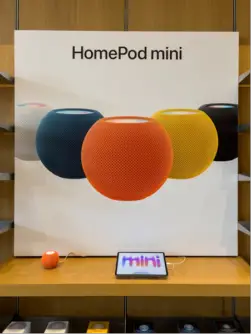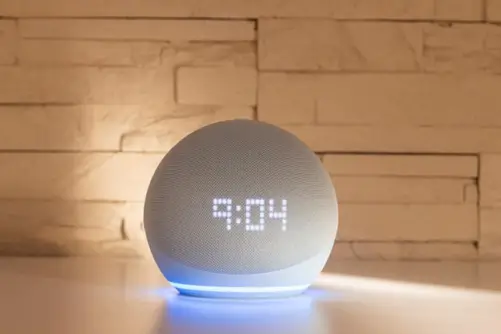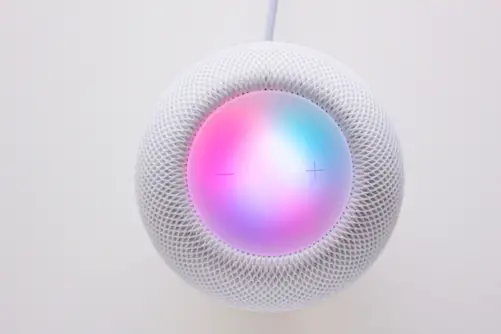Smart speakers are becoming increasingly popular each year, and there’s a good reason why — beyond the conventional audio-playing features they offer, they’re also incredible for using as a smart assistant and pairing with home automation devices.
When comparing different smart speakers on the market, however, it can be hard to figure out which is better. After all, the Echo Dot 5th Gen and Apple HomePod Mini both stand out as spectacular devices.
Here, we will provide all the differences you need to know about the Echo Dot 5th Gen and the Apple HomePod Mini. We aren’t here to sell you on either — but after reading you will be able to determine which is best for you!

~~~ Check Price: Echo Dot 5th Gen. ~~~
~~~Check Price: Apple HomePod Mini ~~~
Portability
Portability can be essential, depending on how you intend to use your new smart speaker. Unfortunately, neither the Echo Dot 5th Gen nor the Apple HomePod Mini offers any level of portability — they both need to be connected to a power source to function.
The Amazon Echo Dot isn’t portable. As mentioned, you’ll need to keep your Amazon Echo Dot plugged into a power source if you want to use it — it doesn’t have any internal batteries. If you look online, however, you can find battery bases allowing you to give your Echo Dot a 5-hour battery life for less than $40.
Likewise, the Apple HomePod Mini isn’t really portable since it needs to be connected to a power source to function. However, many off-brand manufacturers offer portable battery bases that allow you to take your Apple HomePod Mini on the go — and these battery bases can be found for comfortably less than $50, offering up to 9 hours of portable power.
The Amazon Echo Dot 5th Gen and Apple HomePod Mini are equally unportable. However, when considering off-brand battery packs made by the same manufacturer, it’s clear that the Apple HomePod Mini seems more power-efficient (albeit for a few dollars larger price tag).
Design
While the design might not be the most essential factor in picking your new speaker, it’s always a joy to get a new device that matches the aesthetic of your home.
Like the 4th Gen model before it, the Amazon Echo Dot 5th Gen uses a spherical design that measures a modest 3.9 x 3.9 x 3.5 inches. You can purchase the speaker in charcoal, deep sea blue, or glacier white. All colors feature an illuminated blue ring at the bottom of the speaker.
The Apple HomePod Mini is slightly smaller than the Amazon Echo Dot, measuring 3.9 x 3.9 x 3.3 inches. You can purchase it in five colors: white, yellow, orange, blue, and space gray. The speaker’s top is flat, featuring a small control panel that illuminates when you use the device.
Both speakers are attractively designed, but their design is sufficiently different that you may prefer one or the other or be drawn to the yellow or orange HomePod Mini.
Sound Quality
The speaker must sound good if you plan to use your smart speaker for listening to music. Unfortunately, there’s a pretty drastic difference in the sound quality between the Echo Dot 5th Gen and the Apple HomePod Mini.
Undoubtedly, the Amazon Echo Dot 5th Gen has an impressive speaker. The device has one speaker located at the front of the device, however, so the sound is somewhat directional. The speaker is also prone to an issue where it starts producing static noises. The speaker has an impressive depth and resonance at low and medium volumes but can become distorted at high volumes.
The Apple HomePod Mini outcompetes the Echo Dot regarding speaker quality. The speaker is omnidirectional, so the device is easy to place in any corner of a room. Despite how small the device is, it’s excellent at playing every frequency of a song with the right emphasis — even at very loud volumes.
If you aren’t planning on using the speaker for loud music, there’s no doubt that the Amazon Echo Dot 5th Gen will be a beneficial addition to your home. However, the Apple HomePod Mini is a clear winner with its crisp and pleasant omnidirectional sound.

Streaming Services
One of the key features that make smart speakers worthwhile is their incredible convenience. If the smart speaker you choose doesn’t support your streaming service of choice, though, it can quickly become more trouble than it’s worth.
The Amazon Echo Dot syncs well with most music streaming services. It can be directly linked with options like Amazon Music, Spotify, Apple Music, iHeartRadio, Pandora, Deezer, and SiriusXM. Best of all, most users find the device extremely easy to set up for music streaming.
Unfortunately, the Apple HomePod is slightly more limited in what music streaming services can be used with the device. It works with Apple Music, Pandora, Amazon Music, iHeartRadio, Deezer, and some other minor services, but unfortunately, Spotify doesn’t have native support on the speaker. To use Spotify, you must connect the speaker to your phone and control it from the app.
Unfortunately, neither device natively supports Youtube Music. If your streaming service of choice is Spotify, you’ll likely find that the Amazon Echo Dot’s native support makes the device much easier to use. Users of most other streaming apps will find the devices equally useful.
Automation
One of the most compelling features of smart speakers is their ability to sync with smart homes, allowing you to control all of your devices with a simple voice command. Whether you choose the Apple HomePod Mini or the Echo device, you may need to find devices that work with the Amazon Alexa speaker or HomeKit systems.
When you purchase the Amazon Echo Dot 5th Gen, you’ll have direct voice command access to Alexa’s powerful AI. Alexa can provide help with tasks like making to-do lists, setting alarms, providing weather and traffic information, and playing music. It also works with many smart home devices, including smart bulbs, iRobot Roombas, and Nest and Ring smart cameras.
Like the Echo Dot, the Apple HomePod Mini can assist with most basic tasks by saying, “Hey Siri.” If you want your smart devices to be directly connected to the HomePod, you’ll need to find and use a compatible HomeKit iOS device, like Ecobee Smart Thermostats and HomeKit smart bulbs.
It’s safe to say that both speakers are equally good for controlling your smart home, as both options have many incredible devices for you to choose from. If you own some smart devices, it’s worth checking if they offer Alexa or HomeKit syncing before choosing.
Price
Smart speakers can be expensive, unfortunately. But when you take the right approach and shop around, you can find incredible deals on smart devices.
As a general rule, the Echo Dot 5th Generation costs less than half the price of the Apple HomePod Mini. And since Amazon has so many sales across the year, it is possible to find the Echo Dot 5th Gen for significantly cheaper.
If you want to purchase the Echo Dot 5th Gen, it is available with a sub-$50 MSRP on Amazon. But due to the Black Friday and Prime Day sales, as well as Amazon’s tendency to do random deals, it’s possible to find the Echo Dot 5th Generation sold brand new for significantly less (sometimes even half of MSRP).
The Apple HomePod Mini, meanwhile, costs $99.99 at full retail. Whether you purchase the smart device directly from Apple or a retailer like Best Buy, this price remains the same. While you may be able to find a discounted Apple HomePod Mini at an electronics retailer that does open-box discounts, it’s safe to say that the Apple HomePod Mini is the more expensive option of the two.
While there are some crucial differences between the two devices that might affect which one you want to buy, if you’re just looking to use the essential features and save some money while you’re at it, you’re better off purchasing the Echo Dot 5th Gen.

Voice Assistant
If you ever used a voice assistant in the early days of the technology, you’re probably familiar with how frustrating it is when they just don’t understand what you’re saying. Since the early days of the technology, Siri and Alexa have become much more helpful to users.
Since Alexa was released, there’s no doubt that this sophisticated voice assistant has become significantly smarter. In fact, the Echo Dot 5th Gen has been almost unanimously lauded for how well it hears and understands commands — so you’re unlikely to be frustrated with any misunderstandings while using this Amazon device.
Likewise, many users find that the Apple Homepod Mini is great at hearing voices and understanding commands, even in particularly noisy environments. One spectacular feature to note about the HomePod Mini is that it can learn to distinguish up to 6 voices, meaning that every user can have a personalized experience with the HomePod.
It’s safe to say that both speakers are equally good for controlling your home, as both options have many incredible smart home devices for you to choose from. If you own some smart devices, it’s worth checking if they offer Alexa or HomeKit syncing before choosing.
Which Is Better: Echo Dot 5th Gen. or HomePod Mini?
When you compare the Amazon Echo Dot 5th Gen and the Apple HomePod Mini, it’s clear that both devices would make an incredible addition to your home. Whether you intend to use their spectacular voice assistant or to automate your home, there’s no end to the convenient features these devices provide.
The Amazon Echo Dot 5th Gen is the best budget option. It’s slightly larger than the HomePod Mini but is much less expensive and syncs directly with Spotify. If you use smart devices that link with Alexa, there’s no doubt that the Echo Dot is the better device to choose.
Compared to the Echo Dot, however, the Apple HomePod Mini is slightly better in a few ways. The speaker is omnidirectional with much better sound quality, and the device links with many of the same music streaming services. And while the voice assistant is largely the same as the Echo Dot, the HomePod stands out for its ability to distinguish up to 6 users.
Depending on what you want to use the speaker for, either the Amazon Echo Dot 5th Gen or the Apple HomePod Mini may better suit your needs. The HomePod offers slightly higher-quality audio and assistance, while the Echo Dot syncs better with many services. Regardless of which speaker you choose, it won’t be long before you see just how convenient these incredible devices can be.

